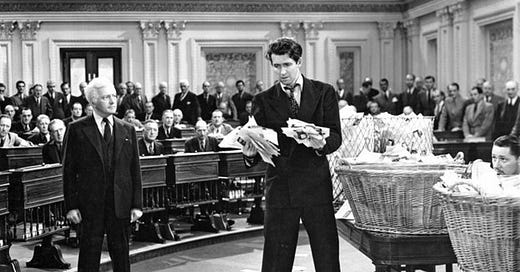Senate Majority Leader John Thune is starting off his tenure on the right foot.
First, he pledged to protect the filibuster – a tool that requires the Senate to have 60 votes to pass most legislation, one of Congress’s last mechanisms to force both parties to work together.
But Leader Thune did not stop there. He also announced that he would oppose a backdoor way of killing the filibuster known as “overruling the Parliamentarian.”
The Parliamentarian of the United States Senate is probably the most important job in Washington that you have never heard of. The Parliamentarian often decides which provisions can and cannot go into legislation, especially for the budget reconciliation process.
Reconciliation is a special type of legislation that is not subject to the filibuster – it can pass the Senate with a simple majority. But it comes with some restrictions called the Byrd Rules1, the most important of which is essentially that every provision in the bill must raise or lower spending or taxes in some way.
This chart shows which of Republicans’ top policy priorities would likely be allowed or not in reconciliation under the Byrd Rules:2
Who decides whether a provision violates the Byrd Rules? Officially, the presiding officer of the Senate makes the call, but they are expected to follow the advice of the Parliamentarian.
The Parliamentarian is a non-partisan expert on the rules and procedures of the Senate. They are appointed by the Senate Majority Leader. The role is currently held by Elizabeth MacDonough, who was first appointed in 2012 and has served under Democratic Leaders Harry Reid and Chuck Schumer as well as Republican Leaders Mitch McConnell and John Thune.
Technically, the presiding officer – Vice President JD Vance or whichever Senator is presiding that day – could ignore the Parliamentarian’s advice and keep any provision in the reconciliation bill. As long as a simple majority – 51 Senators – agree with the presiding officer, the decision stands.
The Senate has disregarded the advice of the Parliamentarian before, most recently in 2013 and 2017 when each party overruled her to eliminate filibusters on judicial nominees. And in 2001, Republican Leader Trent Lott fired and replaced the Parliamentarian during a reconciliation fight. More recently, 43 House Democrats led by Rep. Alexandria Ocasio-Cortez pressured the Senate to overrule the Parliamentarian on reconciliation in 2021, but Senate Democrats held strong.
So far, the Senate has never directly overruled the Parliamentarian on a reconciliation question.
If this happened today, it could mean the end of reconciliation – and perhaps the filibuster – as we know it. If party leaders could not secure 60 votes on a bill, they could simply call it a reconciliation bill, ignore the Parliamentarian, and pass it with a simple majority under this new precedent. It would empower the majority party to move almost any legislation they wanted, which could kill off the prospect for bipartisanship.
This is exactly what Leader Thune is pledging to oppose. He, like Leaders Schumer and McConnell before him, says he will not interfere with the Parliamentarian. For the sake of the Senate, and the country, let’s hope he keeps his word.
Named after former Sen. Robert Byrd, who represented West Virginia from 1959 until his death in 2010.
These are just generalizations; the fine print of a given proposal will ultimately determine whether it’s allowed.





Thank you Peyton. The specifics of what is and isn't allowed seem to some extent a bit subjective (regardless of whether the Senate goes along with the Parliamentarian's ruling or not). The short of it seems to be if it is related to spending/tax credits etc. it is allowed, but any changes to laws/statutes are not allowed. I am glad we have a referee who is a long-time appointee, and that the 2001 firing by Trent Lott does not get repeated soon.
Thank you. I learned a lot and will share